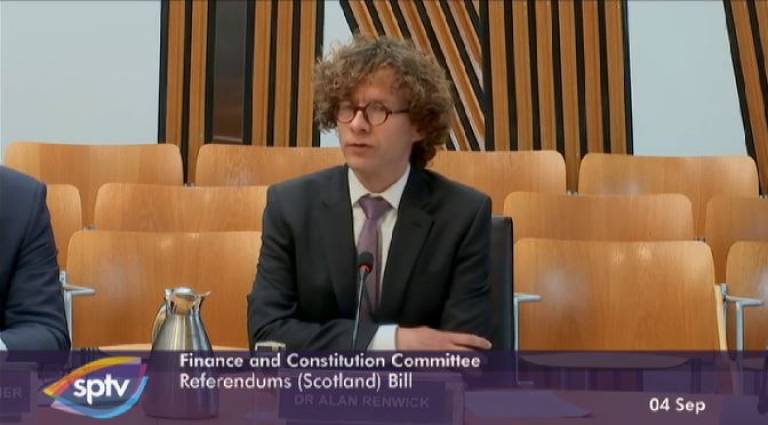Dr Alan Renwick gives evidence on the Scottish government’s referendums bill
5 September 2019
The Unit’s Deputy Director, Dr Alan Renwick, gave evidence in the Scottish Parliament yesterday regarding the Scottish government’s proposed new legislation on the conduct of future referendums.

Dr Renwick was appearing before the Parliament’s Finance and Constitution Committee alongside Unit Fellow Professor Justin Fisher, in the first witness session for the committee’s inquiry into the Referendums (Scotland) Bill.
Key points from Dr Renwick’s evidence included the following:
- He welcomed the overall purpose of the bill, which will give Scotland a standing legislative framework for referendums for the first time. He also praised many aspects of the bill, which largely replicates the existing legislation governing referendums that are called by the UK parliament.
- He was critical, however, of the proposal that ministers should be able to call referendums by secondary legislation. He argued that, in accordance with international best practice, referendums should supplement the processes of representative democracy, and not be used to circumvent them, whether in whole or in part. Referendums are major events with potentially transformative effects, so any decision to hold one should be subject to the greatest possible scrutiny.
- He similarly argued against proposals to limit the role of the Electoral Commission in assessing proposed referendum questions where a question has previously been tested or recommended by the Commission. And he argued that ministerial powers to amend the law by secondary legislation should be curtailed.
- Dr Renwick advocated a range of changes to update the legislation, including by strengthening rules in relation to digital campaigning, improving transparency, and ensuring that restrictions on campaigning by governments are consonant with other parts of the regulatory framework.
- Finally, he argued that the legislation provides an opportunity for Scotland to place itself at the vanguard of democratic practice in relation to referendums. He suggested in particular that Scotland might make use of citizens’ assemblies in relation to future referendums, as it has begun to do with the forthcoming Citizens’ Assembly of Scotland. Building on the report of last year’s Independent Commission on Referendums, he also proposed that two-referendum processes should be employed where a referendum is held initially on a matter of broad principle rather than a specific proposal.
Evidence in full:
Key links:
- Dr Renwick’s written submission to the Committee and the full list of submissions
- Blogpost summarising the written submission on the Unit’s blog
- For further details of the Unit’s research on referendums, see our Elections and Referendums page.
 Close
Close

